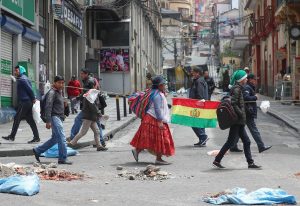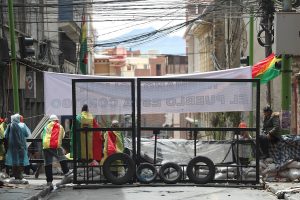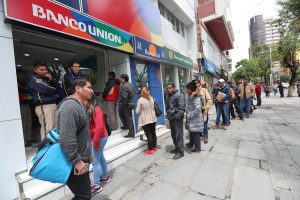
La Paz, Nov 11 (efe-epa).- Bolivia’s military and police took to the streets across the country on Monday after they announced they would join forces to stop the riots unleashed in recent days, as Evo Morales fled to Mexico.
About an hour after the commander-in-chief of the Bolivian Armed Forces, Williams Kaliman, announced that the military would carry out “joint operations” with the Bolivian Police, military aircraft was heard flying over La Paz.
Police officers riding around on motorcycles were also seen, while residents shared on social networks videos of military vehicles moving around areas such as Ciudad Satelite, in El Alto, a neighboring city of La Paz.
In the central city of Cochabamba, where police units were burnt Monday, a helicopter was reported flying over various areas of the city.

The Mexican government confirmed Monday that Evo Morales, who resigned at the weekend as Bolivian president after nearly 14 years in power, was aboard a plane it had sent to the South American country after it had granted him asylum for “humanitarian reasons.”
Kaliman had said in his announcement with several military chiefs, that “in compliance with the constitutional mission, the military command has prepared the Armed Forces to conduct joint operations with the Bolivian Police in order to avoid bloodshed and mourning of the Bolivian family, using proportionally force against groups of vandals’ acts that cause terror in the city.”
“The Armed Forces will never open fire” against the people, he added and reiterated his call “to the sanity and peace of our beloved Bolivia.”
The Bolivian Police earlier Monday had demanded that the army be deployed on the streets, calling the current situation in the country “unsustainable” and saying that they are “overwhelmed” with trying to contain the violence in the wake of President Evo Morales’ resignation on the weekend.

A top police official told the media in La Paz that the force is not ready to carry “the dead on our shoulders,” given that they contend they are facing violent groups outfitted with firearms and with the “intention to kill.”
The police commander for La Paz, Antonio Barrenechea, said that the force has been mobilized for the past 21 days amid the ongoing political crisis since the Oct. 20 national elections and have been “handling” the situation but adding that “it’s not possible” to contain the situation any longer.
Berranechea, who publicly appeared along with other top police leadership, called for military intervention so that “the rule of law prevails, to restore peace and calm.”
He said that the armed groups they are facing “regrettably, I don’t know what to call them, they have other intentions, they’ve been provided with firearms, with the intention of killing and we cannot allow that.”
The police, he said, cannot confront these armed groups with just tear gas and other riot control measures.
“We have decided to ask for the support of the armed forces” to reestablish social peace and avoid more deaths, he emphasized.

Earlier on Monday, Morales’ letter resigning as president was received Monday by the Bolivian Legislative Assembly, but the lack of a quorum forced the body to adjourn without taking any action.
“My responsibility as the indigenous president of all Bolivians is to avoid that the coup-makers continue persecuting my brother and sister labor leaders,” Morales wrote.
Senate sources confirmed to EFE that the text was authentic.
The leftist announced Sunday that he was stepping down after the military high command publicly called on him to resign amid an escalating crisis stemming from accusations by the opposition that Morales’ latest election victory was tainted by fraud.
Hours earlier, Morales had offered to call fresh elections, to be overseen by a new electoral court.
His resignation followed arson attacks on the homes of his sister and officials belonging to the governing MAS and in his video message, Morales, 60, said that family members of his political allies were being threatened and, in some cases, held hostage.
